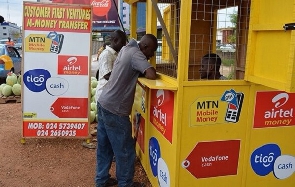 MoMo agent serving a customer
MoMo agent serving a customer
The 2023 FinTech Sector Report by the Bank of Ghana (BoG) has revealed significant growth in the country’s digital financial landscape, with mobile money accounts surpassing GH¢65 million and transaction values exceeding GH¢1.9 trillion.
This marks a major milestone in Ghana’s journey towards a more inclusive and cash-lite economy.
This growth is driven by the increasing adoption of mobile financial services, which provides a reliable and efficient means for millions of Ghanaians, especially in underserved and rural areas, to access financial services.
The report highlights how mobile money has become a dominant force in Ghana’s financial ecosystem, with the volume of transactions experiencing exponential growth year after year.
The Bank of Ghana underscores the critical role of Rural and Community Banks (RCBs) in the national financial inclusion agenda.
The central bank had indicated that RCBs, which served as a key financial service provider for rural populations, had a unique opportunity to harness the power of technology and digitalisation in their operations.
By adopting digital solutions, RCBs could help bridge the financial access gap in rural areas, providing more tailored services to meet the needs of local communities.
Mrs Elsie Addo Awadzi, the Second Deputy Governor of the BoG, at the 23rd Annual Chief Executive Officers’ Conference in Ho, in an address delivered on her behalf by Mr Yaw Sapong, Director of the other Financial Institutions Supervision Department at the BoG, emphasised the importance of digital transformation in the rural banking sector.
She noted that RCBs must leverage technology to expand their reach and improve the quality of services they provide.
She highlighted the BoG’s commitment to driving financial inclusion through digital initiatives, pointing to the success of the Ghanapay initiative, which was a national digital payments platform, designed to enhance financial service delivery, particularly in rural areas.
Mrs Awadzi encouraged RCBs to embrace this platform and foster partnerships with FinTech companies, through the ARB Apex Bank, to further innovate and tailor their services to the needs of their customers.
She also stressed the need for RCBs to go beyond offering generic financial products, saying, to truly serve rural populations effectively, RCBs must develop tailored financial solutions that address the unique needs of local communities.
This includes understanding the financial cycles of farmers, small-scale traders, especially women and persons with disabilities, and local businesses.
By offering services such as savings and loan products aligned with agricultural and business cycles, RCBs could ensure that their offerings were relevant and accessible to their target clientele, she said.
This approach, she noted, would not only strengthen the financial health of rural populations but also position RCBs as the first point of contact for financial services in these areas.
To sustain this momentum, Mrs Awadzi urged RCBs to invest in capacity building and good corporate governance practices, developing the skills of staff members will allow RCBs to adapt to evolving financial needs, while sound governance structures will enhance accountability and long-term financial stability.
Mr Alex Kwesi Awuah, the Managing Director of ARB Apex Bank, also lauded the successful implementation of the Financial Sector Development Project (FSDP).
Supported by the Government of Ghana and the World Bank, the FSDP had been instrumental in operationalising digital banking platforms for RCBs, allowing them to offer seamless and secure digital financial services to their customers.
Mr Awuah highlighted that the digital transformation of RCBs had not only improved their operational efficiency but had also enabled them to expand their customer base, bringing more Ghanaians into the formal financial sector.
The 23rd Annual CEOs Conference, which brought together 147 CEOs from RCBs across the country, provided a platform for leaders in rural banking to discuss challenges, opportunities, and the future of the sector.
Held on the theme: “Positioning Rural Banking at the Centre of the National Financial Inclusion Agenda,” the event also featured representatives from the Bank of Ghana, executives from the Association of Rural Banks, and the Board Chairman of ARB Apex Bank, Dr Toni Aubyn.
As the rural banking sector continues to play a pivotal role in Ghana’s financial landscape, the adoption of technology and a customer-centric approach will be essential in ensuring sustainable growth and widespread financial inclusion across the country.
